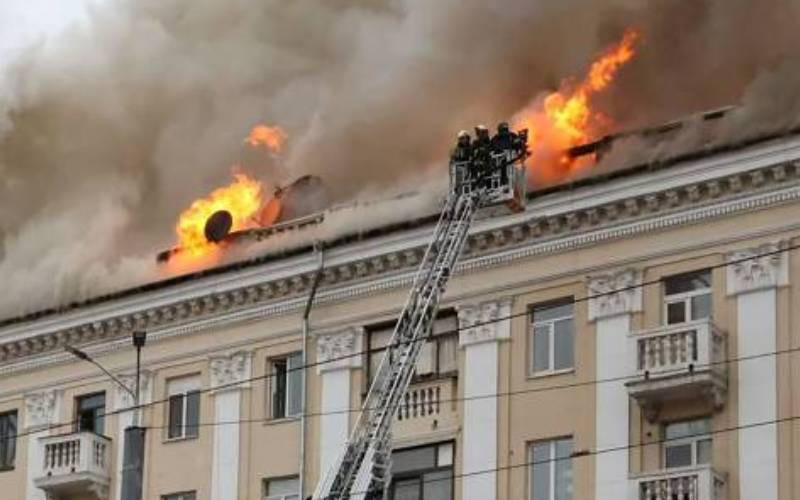On the brink: The bubble that was Eastleigh is threatening to burst as shoppers and traders flee the area in the wake of mysterious terror attacks
The picture of Eastleigh is one of total withdrawal and subjugation.
The poor roads that had caved in under the weight of human traffic are empty.
Human traffic within the Eastleigh peri-urban shopping centre has thinned to unimaginable levels like the morning dew that evaporates with the rising sun.
The flow of toxic sludge — evidence of human life and activity — onto the roads is gradually drying up.
The verandas of mega buildings that teemed with hawkers and wares on display have been zone off with mean nylon ropes — as if to keep the ‘bad guys’ away.
The hawkers, whose daily bread singularly hinged on shouting, have since gone mute — vending their wares in silence and only occasionally waving gently at a passing onlooker.
The stalls that housed not just the merchandise but secret safes hoarding millions of shillings are deserted in their dozens.
Public transport is a sorry portrait of a battered sub-sector. PSV conductors — known for the sub-culture of violence and ruthlessness — have been reduced to a tame lot. Seated in their vessels, they count on providence and blank stares to bring passengers their way.
The drivers, openly bored due to an alien culture — one of total order and silence — drift off in thoughts. With vehicle stereos in the mute piling onto their misery, the drivers often doze off as they await a signal from their conductors to step on the pedal.
Shoppers and traders alike talk in low tones — occasionally glancing over their shoulders as they barter their suspicions.
This is the new Eastleigh where fear of the unknown is the new commodity in stock.
The recent wave of terror attacks in the area has sent a chill down the spine of residents and shoppers alike. The security crackdown that followed has only made life harder and business near impossible.
Businesses worth billions of shillings are either closing down in Eastleigh or being relocated to other countries.
Business Beat has authoritatively learnt that proprietors are fleeing the region’s business hub to escape a sting of security operations targeting aliens — most of who run a chain of businesses in the area.
Stay informed. Subscribe to our newsletter
Massive withdrawals
Banks that rushed to the area are already feeling the pinch of the fleeing businesspeople.
Our investigations reveal that an estimated Sh10 billion was withdrawn from 12 banks that operate in the area in the past three months alone.
Efforts to get a comment from Barclays Bank Managing Director Adan Mohammed proved futile, as he did not respond to our phone calls.
Paul Sesi, Head of Operations at Chase Bank, which also operates in the area said Chase Bank hadn’t witnessed any panic withdrawals.
“We are yet to see anything untoward,” said Sesi. “We haven’t been affected and are operating normally.”
But even as operators in the areas denied knowledge of anything unseemly, Barclays Bank, which used to operate two branches on a 24-hour basis, has since stopped night operations due to lack of customers.
“Barclays now operates only day time because the night business is dead,” says Hussein Roba, Chairman Eastleigh Residents Community Association (ERCA).
“People no longer sell or buy at night because nobody wants to dare the police to a duel.”
A few months ago, the Government outlawed the alien card — apparently the only identity and security some of the traders held — making their stay in the country untenable.
“The government recently issued a directive that such people should either go back to their countries of origin or refugee camps,” says Eastleigh District Officer Charles Muiruri.
Some of the traders are reportedly fleeing to Somalia, Uganda and Dubai while others are said to be ‘melting’ into within the country — most notably at the Coast.
Analysts say the developments in Eastleigh — previously believed to be nexus of unexplained cash flows from piracy and sneaked goods from Somalia, vindicate a report by the Kenya National Bureau of Statistics (KNBS) for the quarter ending June 2012. The report showed that unexplained forex flows dropped to the lowest level.
“There is widespread belief that some of the money used to fund the booming property market in Kenya and other businesses is from Somalia,” says Job Kihumba a director at Standard Investment Bank (SIB).
“It is likely that this money found its way to Eastleigh.”
According to the KNBS data, unexplained foreign money in Kenya’s banking system fell to Sh6.5 billion ($76.5 million) mid last year from a high of Sh170 billion ($2 billion) at the beginning of 2011 — the lowest in five years.
Cheap imports
Kenya had also been flooded by billions of shillings worth of goods imported through the Al-Shabaab controlled Somalia coastline — and sold cheaply into the market. However, this has severely been affected by the fall of Kismayu.
Provincial administrators say smugglers have been trying to sneak in goods from Ethiopia through Moyale into the area, but this has proved costly, especially with the influx of cheaper goods from China.
The security operation in Eastleigh started slightly over six months ago, but has intensified in the recent past following a series of blasts in the area.
It is believed the successful excursion of Kenya Defence Forces (KDF’s) in Somalia has helped stem piracy in Indian Ocean and blocked the routes used by smugglers to sneak in goods to the country.
“Eastleigh is at a critical crossroads and will likely emerge from the ongoing crisis looking quite different from the one we know today,” says Kihumba.
“Most businesses that operate there will be affected in some way, regardless of how the security operation unfolds.”
The exodus of moneyed immigrants, mostly of Somali origin, has also left property owners in Eastleigh chalking up huge losses in lost rent.
In fact, the provincial administration is now fighting to stem an explosive situation brewing between thousands of vacating tenants who are all demanding back their rent deposits and reluctant property owners, some of who are still repaying the loans they used to build the houses.
“It is true we are swamped by numerous cases between landlords and several tenants who are vacating,” says Muiruri.
Muiruri says the situation is so complex that in some instances, a property owner is swamped by more than 20 tenants all demanding their deposits back because they are relocating.
In a familiar tale of high-living in the boom years, followed by an uncomfortable return to reality, the landlords borrowed heftily from banks to construct houses for the incoming immigrants.
The exodus of the ‘refugees’ has triggered a plunge in the value of the assets the loans were based on — with some borrowers reportedly having trouble making repayments.
The fleeing traders have also left several business premises in prime areas like Garissa Lodge unoccupied.
A survey by Business Beat revealed a number of vacant business premises in Eastleigh’s business hub where 16 tenants vacated a mall referred to as Yaburiani last week.
According to Hussein, Sh500 million used to exchange hands in Eastleigh’s major business hub before the security operation, but things have since changed with estimates showing the figures could have plunged to Sh150 million.
A high-ranking provincial administrator who requested not to be named due to sensitivity of the matter confirmed the figures.
Besides local traders who come from various towns to buy stuff from Garissa Lodge, it has also been a key wholesale market for traders from the Democratic Republic of Congo, Rwanda and Uganda.
These people have started shying away from Eastleigh on growing perceptions of insecurity in Nairobi peri-urban shopping centre and most importantly, because the people they used to buy from are running away.
Incidentally, certain sectors of the Eastleigh economy have received a boost since the sporadic attacks and subsequent security operation with the most notable being security companies and taxi operators.
Providing alternative means of transport for staff unwilling to travel into branches in Eastleigh was the principal cost of the situation for two banks that have branches in the area.
“They have deployed more security personnel at their premises and we now have to pick and drop members of their staff who fear being caught in potentially explosive situations in the area,” says a taxi operator who requested not to be named.
It is booming business for taxi operators and security guards who now have extra duties, but the situation is not enjoyable because we also have to check what is happening behind our backs.”
There are now fears that the relocation of businesses from Eastleigh could have longer-term economic repercussions revenue collections.
The fall in property prices, reduction of business activities and its impact on the retail and hotel industries could also have far reaching ramifications in the country.
Financial institutions that provided loans towards the construction of some of these properties could be facing a potentially crippling situation as they could end up with assets in collaterals whose value is way below the amount given.
For example unofficial estimates show that Nairobi City Council would collect Sh50 million less in taxes than in the previous fiscal year, with loss of parking fees and other licences from traders responsible for a huge chunk of the loss.
The remainder is a result of the decreases in value of other property in the area and, interestingly, by a reduction in the value of hotels.
 The Standard Group Plc is a
multi-media organization with investments in media platforms spanning newspaper
print operations, television, radio broadcasting, digital and online services. The
Standard Group is recognized as a leading multi-media house in Kenya with a key
influence in matters of national and international interest.
The Standard Group Plc is a
multi-media organization with investments in media platforms spanning newspaper
print operations, television, radio broadcasting, digital and online services. The
Standard Group is recognized as a leading multi-media house in Kenya with a key
influence in matters of national and international interest.
 The Standard Group Plc is a
multi-media organization with investments in media platforms spanning newspaper
print operations, television, radio broadcasting, digital and online services. The
Standard Group is recognized as a leading multi-media house in Kenya with a key
influence in matters of national and international interest.
The Standard Group Plc is a
multi-media organization with investments in media platforms spanning newspaper
print operations, television, radio broadcasting, digital and online services. The
Standard Group is recognized as a leading multi-media house in Kenya with a key
influence in matters of national and international interest.







